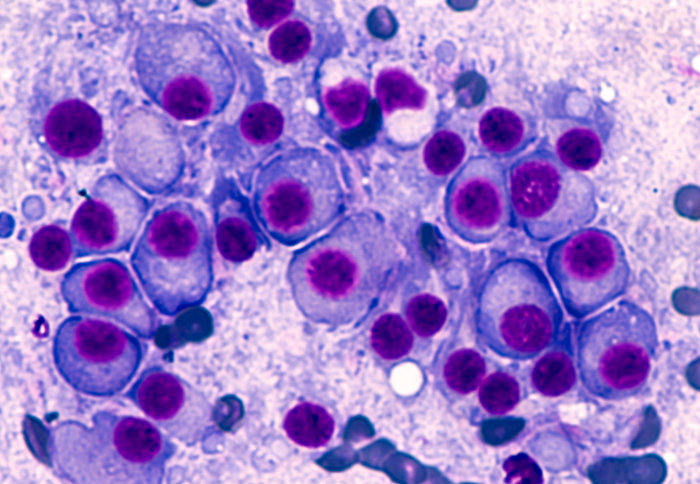£10 million gift to drive breakthrough new treatments for myeloma

Bone marrow aspirate cytology of multiple myeloma
Imperial College London will establish a new centre for myeloma research at Hammersmith Hospital, thanks to a £10 million donation.
The gift, from benefactors Hugh and Josseline Langmuir, will pave the way for new and better treatments for myeloma patients and bolster Imperial’s world-leading research into blood disorders.
Donations such as this are truly transformative, allowing us to bring together talented people, unleash potential, and surmount some of the greatest challenges facing society. Professor Alice Gast President, Imperial College London
Myeloma is a kind of blood cancer that develops in plasma cells, affecting the bones, kidneys and immune system. While treatment can prolong life, the disease is currently incurable.
The new Hugh & Josseline Langmuir Centre for Myeloma Research will support pioneering research into the causes, mechanisms and treatment of myeloma and will accelerate the translation of scientific discoveries into clinical solutions.
Imperial’s Centre for Haematology at the College’s Hammersmith Hospital Campus is one of the world’s leading diagnostic and treatment centres for blood disorders. It brings together researchers and clinicians to deliver fundamental, translational and clinical research programmes encompassing all aspects of haematology – including myeloma.
The Centre was one of the first hospital teams in Europe to perform a stem cell transplant using donor cells, and the first centre in Europe to perform successful unrelated donor bone marrow transplant for aplastic anaemia and chronic myeloid leukaemia.
Unlocking new research
Imperial’s lab-based myeloma research programme is led by three principal investigators – Professor Anastasios Karadimitris, Dr Aristeidis Chaidos and Dr Holger Auner – and is home to ten fulltime clinical and scientific staff dedicated to myeloma research. This new centre will provide a focal point for this activity, allowing Imperial to consolidate and grow research into this devastating disease.

The £10 million gift will fund the creation of the centre at Imperial’s Hammersmith Hospital Campus providing cutting-edge facilities and equipment, and space for researchers and clinicians to collaborate. It will also allow the College to recruit, train and support talented researchers from around the world, strengthening its existing academic team, unlocking new research avenues, and augmenting its innovation capacity.
Through its proximity to Imperial’s White City Campus, which co-locates academics, global companies and emerging businesses, the Centre will drive collaborations with researchers in fields such as genomics, bioinformatics and drug discovery, as well as with multidisciplinary groups, start-up companies and corporate partners.
Ambitious vision
Professor Jane Apperley, Chair of the Department of Haematology, said: “Imperial has an outstanding track record in myeloma and haematology research. Our researchers are making ground-breaking advances in our understanding of disease, identifying new drug targets, optimising immune based therapies and working tirelessly to take new therapies through to clinical trials for patient benefit.
“Despite our successes, there is still so much more we want - and need - to achieve in order to better treat myeloma and other blood disorders. This incredibly generous donation will allow us to harness and focus our strengths to realise this ambitious vision.”

Professor Jonathan Weber, Dean of the Faculty of Medicine, said: “Myeloma research is an area that holds incredible potential, and yet is not currently well funded. The Langmuirs’ generosity will have an immediate and lasting impact - accelerating the translation of pioneering science into revolutionary treatments and therapies for myeloma patients.”
Professor Alice Gast, President of Imperial College London said: “Donations such as this are truly transformative, allowing us to bring together talented people, unleash potential, and surmount some of the greatest challenges facing society. We are profoundly grateful to Hugh and Josseline Langmuir for their generosity and foresight in supporting this critical work. Patients and their families will reap the benefits for generations to come.”
Hugh Langmuir said: “We have been hugely impressed by the skill and dedication of Imperial’s medical staff and by the quality of research being conducted at the Hammersmith Haematology Unit. With the increased resources made possible by this donation, we hope to assist the team in their important work of furthering our understanding of this disease and developing new and more effective treatments.”
- Photo credit (main image): Shutterstock // David Litman
- Photo credit (main body, myeloma): Shutterstock // David Litman
Article text (excluding photos or graphics) © Imperial College London.
Photos and graphics subject to third party copyright used with permission or © Imperial College London.
Reporter
Deborah Evanson
Communications Division